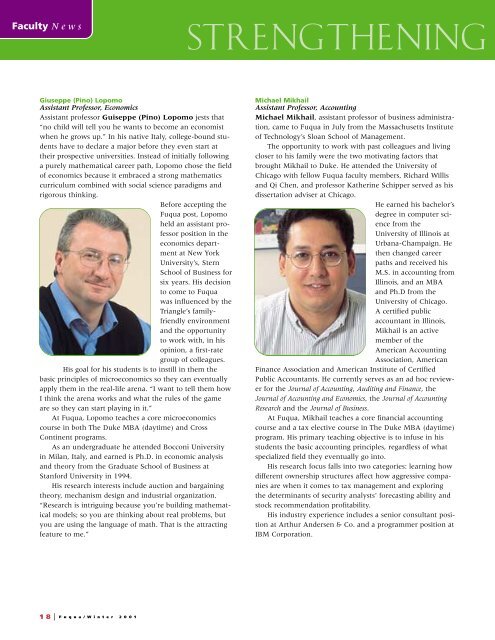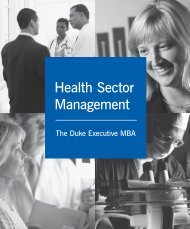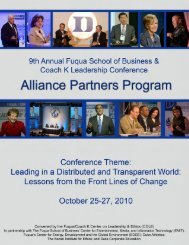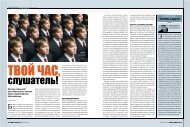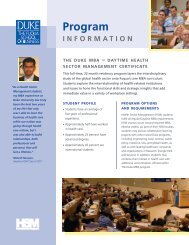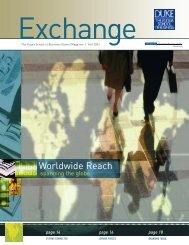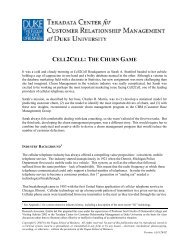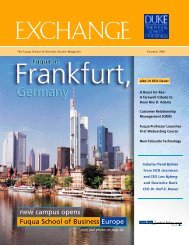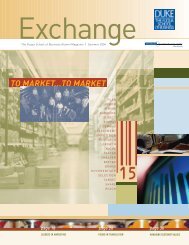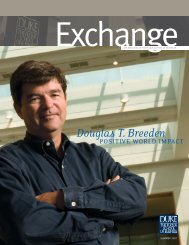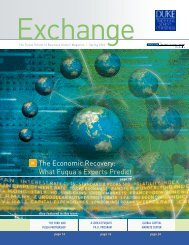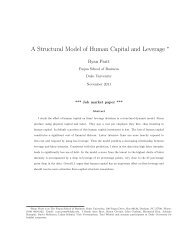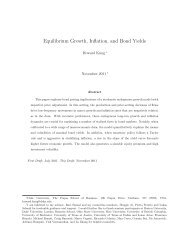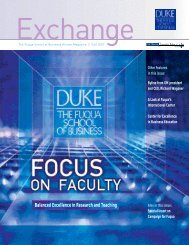A l u m n i M a g a z i n e - Duke University's Fuqua School of Business
A l u m n i M a g a z i n e - Duke University's Fuqua School of Business
A l u m n i M a g a z i n e - Duke University's Fuqua School of Business
You also want an ePaper? Increase the reach of your titles
YUMPU automatically turns print PDFs into web optimized ePapers that Google loves.
Faculty N ews<br />
Giuseppe (Pino) Lopomo<br />
Assistant Pr<strong>of</strong>essor, Economics<br />
Assistant pr<strong>of</strong>essor Guiseppe (Pino) Lopomo jests that<br />
“no child will tell you he wants to become an economist<br />
when he grows up.” In his native Italy, college-bound students<br />
have to declare a major before they even start at<br />
their prospective universities. Instead <strong>of</strong> initially following<br />
a purely mathematical career path, Lopomo chose the field<br />
<strong>of</strong> economics because it embraced a strong mathematics<br />
curriculum combined with social science paradigms and<br />
rigorous thinking.<br />
Before accepting the<br />
<strong>Fuqua</strong> post, Lopomo<br />
held an assistant pr<strong>of</strong>essor<br />
position in the<br />
economics department<br />
at New York<br />
University’s, Stern<br />
<strong>School</strong> <strong>of</strong> <strong>Business</strong> for<br />
six years. His decision<br />
to come to <strong>Fuqua</strong><br />
was influenced by the<br />
Triangle’s familyfriendly<br />
environment<br />
and the opportunity<br />
to work with, in his<br />
opinion, a first-rate<br />
group <strong>of</strong> colleagues.<br />
His goal for his students is to instill in them the<br />
basic principles <strong>of</strong> microeconomics so they can eventually<br />
apply them in the real-life arena. “I want to tell them how<br />
I think the arena works and what the rules <strong>of</strong> the game<br />
are so they can start playing in it.”<br />
At <strong>Fuqua</strong>, Lopomo teaches a core microeconomics<br />
course in both The <strong>Duke</strong> MBA (daytime) and Cross<br />
Continent programs.<br />
As an undergraduate he attended Bocconi University<br />
in Milan, Italy, and earned is Ph.D. in economic analysis<br />
and theory from the Graduate <strong>School</strong> <strong>of</strong> <strong>Business</strong> at<br />
Stanford University in 1994.<br />
His research interests include auction and bargaining<br />
theory, mechanism design and industrial organization.<br />
“Research is intriguing because you’re building mathematical<br />
models; so you are thinking about real problems, but<br />
you are using the language <strong>of</strong> math. That is the attracting<br />
feature to me.”<br />
18I F u q u a / W i n t e r 2 0 0 1<br />
strengthening<br />
Michael Mikhail<br />
Assistant Pr<strong>of</strong>essor, Accounting<br />
Michael Mikhail, assistant pr<strong>of</strong>essor <strong>of</strong> business administration,<br />
came to <strong>Fuqua</strong> in July from the Massachusetts Institute<br />
<strong>of</strong> Technology’s Sloan <strong>School</strong> <strong>of</strong> Management.<br />
The opportunity to work with past colleagues and living<br />
closer to his family were the two motivating factors that<br />
brought Mikhail to <strong>Duke</strong>. He attended the University <strong>of</strong><br />
Chicago with fellow <strong>Fuqua</strong> faculty members, Richard Willis<br />
and Qi Chen, and pr<strong>of</strong>essor Katherine Schipper served as his<br />
dissertation adviser at Chicago.<br />
He earned his bachelor’s<br />
degree in computer science<br />
from the<br />
University <strong>of</strong> Illinois at<br />
Urbana-Champaign. He<br />
then changed career<br />
paths and received his<br />
M.S. in accounting from<br />
Illinois, and an MBA<br />
and Ph.D from the<br />
University <strong>of</strong> Chicago.<br />
A certified public<br />
accountant in Illinois,<br />
Mikhail is an active<br />
member <strong>of</strong> the<br />
American Accounting<br />
Association, American<br />
Finance Association and American Institute <strong>of</strong> Certified<br />
Public Accountants. He currently serves as an ad hoc reviewer<br />
for the Journal <strong>of</strong> Accounting, Auditing and Finance, the<br />
Journal <strong>of</strong> Accounting and Economics, the Journal <strong>of</strong> Accounting<br />
Research and the Journal <strong>of</strong> <strong>Business</strong>.<br />
At <strong>Fuqua</strong>, Mikhail teaches a core financial accounting<br />
course and a tax elective course in The <strong>Duke</strong> MBA (daytime)<br />
program. His primary teaching objective is to infuse in his<br />
students the basic accounting principles, regardless <strong>of</strong> what<br />
specialized field they eventually go into.<br />
His research focus falls into two categories: learning how<br />
different ownership structures affect how aggressive companies<br />
are when it comes to tax management and exploring<br />
the determinants <strong>of</strong> security analysts’ forecasting ability and<br />
stock recommendation pr<strong>of</strong>itability.<br />
His industry experience includes a senior consultant position<br />
at Arthur Andersen & Co. and a programmer position at<br />
IBM Corporation.


